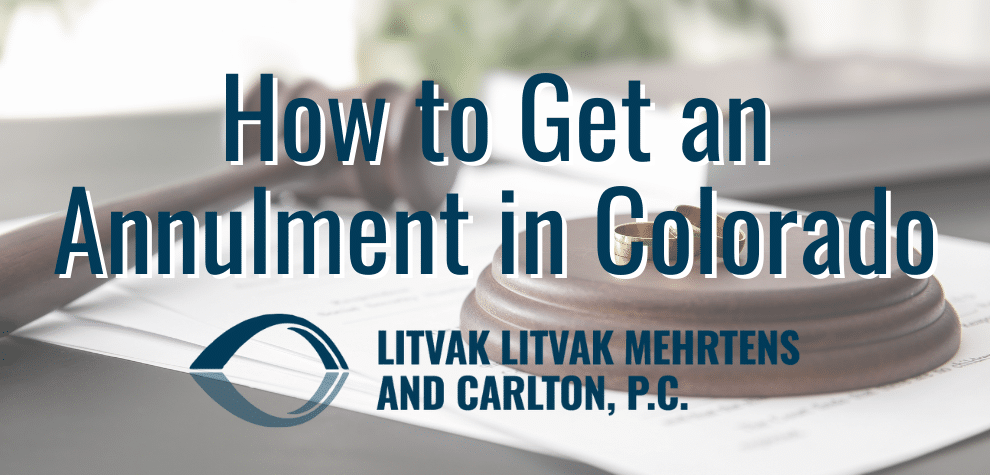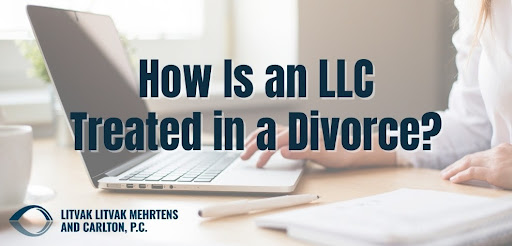Many individuals believe that getting an annulment in Colorado is only a quick method to end a short marriage. The truth is that a declaration of invalidity of marriage is an uncommon occurrence. Because of no-fault divorces, it’s never easier than getting a divorce. Hearing about celebrities annulling short weddings after day simply feeds the myth that annulments dissolve every short marriage. However, there are certain situations where an annulment makes sense.
At Litvak Litvak Mehrtens and Carlton, our Denver divorce attorneys are prepared to explore every possible option for you. Whether you choose divorce, legal separation, or annulment, we’re prepared to represent you. To arrange a consultation with us, please call our Denver office at 303-951-4506. You can also fill out our online intake form today. As one of Colorado’s most respected family law firms, we won’t cut corners to get the best possible outcome.
What Is an Annulment in Colorado?
Annulment and divorce are the two legal methods to dissolve a marriage. An annulment is a legal proceeding that ends a relationship. From a legal standpoint, an annulled marriage proclaims that the marriage never technically happened and was never lawful.
In Colorado, there is no distinction between an annulment and a dissolution in terms of the outcome. The legal difference is that with an annulment, the marriage basically never happened. This may appeal to people who would prefer to avoid a divorce for religious reasons. It also appeals to those who want to reestablish benefits or payments that have been lost when one person marries.
What Are the Legal Grounds for an Annulment?
An annulment is more difficult to get than a divorce in Colorado. This is because just showing that the marriage has broken is not enough. Instead, a spouse requesting a declaration of marriage invalidity must establish one of the legal grounds specified in C.R.S. 14-10-111. (1).
- Lack of mental capacity. At the time of the marriage, one of the spouses lacked the mental ability to agree. This might be due to the use of drugs, alcohol, or another type of incapacitation.
- Not consummated. The other spouse was unaware that one of the spouses lacked the physical ability to consummate the marriage, or have intercourse, at the start of the relationship.
- Age of consent. A partner was still under the age of consent to marry and did not obtain authorization to marry. This authorization comes from parents, legal guardians, or Colorado family law courts.
- Fraud. One spouse married based on the other’s deception or deception, which was central to the marriage. Examples include the following.
- Claim of illness
- Marrying someone for Visa
- Marrying someone for financial gain
- Duress. Under coercion, one or both spouses married.
- Jest. As a joke or dare, one or both spouses married.
- Void due to certain reasons. Under the laws where the marriage took place, the marriage was void. This is due to bigamy, polygamy, incest, or any other cause.
What Are the Deadlines for an Annulment?
An annulment must be started within the timeframes listed below, and only by the people listed.
- Lack of mental capacity, fraud, duress, jest: The annulment deadline is within 6 months of learning about the reason for the annulment. It can only be filed by the wronged spouse or a representative of theirs.
- Lack of ability to consummate: The annulment deadline is within 12 months of learning of the reason, by the wronged spouse.
- Age of consent: The annulment deadline is within 24 months of the marriage, either by the spouse or their parent or legal guardian.
- Void marriage: At any point prior to the death of the spouse or settlement of either of the estates of either spouse. It must be filed by one of the spouses, their children, or a state official.
What Is the Annulment Process Like?
In an annulment proceeding, the standard of evidence is the same as in other civil cases: a majority of the evidence. The processes for an annulment are the same as for a divorce or legal separation, with the exception that one spouse does not have to be a resident for 91 days before the annulment may begin. In addition, there is no mandatory 91-day waiting time between the start of proceedings and the decision of nullity of marriage.
If the marriage took place in Colorado, an annulment can be filed at any point throughout the time period mentioned above, according to C.R.S. 14-10-111(7). If the marriage took place outside of Colorado, at least one of the spouses must have lived in Colorado for at least 30 days before filing the annulment petition.
The domestic relations court must still address matters such as the division of marital assets and debts, support, and, if there are children, parental rights and obligations. They also address child support in annulment proceedings. A disputed annulment will, in all likelihood, take as much time as a divorce or legal separation.
Even if the annulment is uncontested, most people have less luck than celebrities in obtaining a Colorado family law court or magistrate who would issue the annulment as swiftly as popular media portrays.
What If I Have Children and Want an Annulment?
Despite the fact that Colorado will annul a marriage retroactively to the day it was entered into, any children produced from the marriage will be regarded as genuine. While this may have been important in the past, it is now difficult to locate a legislation that distinguishes between children born in and out of wedlock.
An annulment isn’t any different from a divorce or a legal separation in terms of parenting and child support. The same statutory concerns of the best interests of the children apply, as do the same child support standards. Unless the explanation also shows the individual is a terrible parent, it doesn’t matter who was at fault or who was the wronged spouse in an annulment.
How Does an Annulment Affect Debts and Financial Problems?
In most annulment cases, the court will still need to address the parties’ financial difficulties. In certain extreme situations, however, this may be limited. What exactly does this imply? Regardless of the fact that Colorado is a no-fault state, you should try to argue blame in an annulment. If the other spouse participated in fraudulent activity that led to the annulment, the court may hold it against that spouse and withhold maintenance or a portion of marital assets.
How Does an Annulment Affect Maintenance Obligations?
A support duty ceases when the receiving spouse remarries, according to C.R.S. 14-10-122(2). What happens, though, if the remarriage is annulled? The previous maintenance requirement may be restored, according to the Colorado Supreme Court.
The Court acknowledged that the first spouse may have moved on and made logical judgments based on the expectation of no longer having a maintenance duty. Thus, reinstatement of spousal maintenance is not automatic. Instead, the judge must consider a number of factors, such as the length of the second marriage, whether the annulment was properly performed or if the spouses colluded, whether the spouse was getting maintenance from the invalidated second marriage, the parties’ financial circumstances, and so on.
Annulments and Military Basic Allowance for Housing
If a military member’s marriage is annulled because it is simply voidable, the military member is entitled to all BAH paid until the decision declaring the marriage invalid. In other words, the military will handle an invalidated marriage in the same way that a divorced marriage would be treated.
An annulment on the basis that the marriage is void, on the other hand, is a different story. When a member discovers that their spouse was still married at the time of the marriage, or was a banned family member, their right to BAH terminates. Any BAH paid between then and the pronouncement of marital invalidity must be returned.
Additionally, BAH payments made on the basis of an invalid marriage may be repaid unless the court concludes that the military member entered the marriage in earnest, or the military examines and concludes that the member entered the marriage in good faith, validating the earlier BAH payments.
Do You Need a Lawyer for an Annulment in Colorado?
No situation forces you to hire an attorney. However, we recommend hiring an attorney for an annulment in Colorado. This is due to the simple fact that courts will hold you to the same standards as an attorney, even if you represent yourself. Unless you know the law inside an out as a Colorado family lawyer will, hiring a lawyer is your best bet.
Contact a Colorado Annulment Lawyer Today
At Litvak Litvak Mehrtens and Carlton, our firm’s family law attorneys have extensive expertise guiding clients through the Colorado legal system. We are well-versed in Colorado family law, from divorce to child custody, annulments, property division to high asset divorce difficulties. To arrange a consultation with us, please call 303-951-4506 or fill out our online intake form today.






